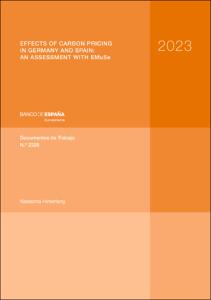Effects of carbon pricing in Germany and Spain: an assessment with EMuSe
Authors
Issue Date
29-Sep-2023
Physical description
67 p.
Abstract
Utilizando el modelo dinámico de equilibrio general multisectorial medioambiental de tres regiones EMuSe, encontramos que una tarificación del carbono limitada a Alemania o España solo conduce a un efecto negativo permanente sobre la producción en estas economías. La reducción de emisiones que ello provoca no es lo suficientemente grande como para compensar el aumento de los costes marginales de producción. Si el resto de Europa se adhiere al sistema de tarificación del carbono, los efectos a largo plazo sobre la producción serán positivos. Sin embargo, en este caso, los costes de transición serían aún mayores debido a las estrechas relaciones comerciales dentro de Europa. Encontramos evidencias que apuntan a la fuga de carbono, la cual puede reducirse ligeramente mediante un mecanismo de ajuste en frontera. Aun así, este mecanismo no cambia las reglas del juego, ya que protege principalmente a los sectores nacionales contaminantes. Mientras que Alemania se beneficia del ajuste fronterizo, España sale perdiendo durante la transición, aunque a la larga el sector energético español será el más beneficiado por su relativamente baja intensidad de emisiones. Por último, Europa cuenta con un gran incentivo para que el resto del mundo se sume a la iniciativa, ya que así la recesión será más breve y los beneficios a largo plazo serán mayores.
Using the dynamic, three-region environmental multi-sector general equilibrium model EMuSe, we find that pricing carbon in Germany or Spain only leads to a permanent negative effect on output in these economies. The induced emissions reduction is not large enough to overcompensate for the increase in marginal production costs. If the rest of Europe joins the carbon pricing scheme, long-run output effects are positive. However, in this case, transition costs are even larger due to close trade relations within Europe. We find evidence for carbon leakage, which can be reduced slightly by a border adjustment mechanism. Still, it is no game changer as it mainly protects dirty domestic sectors. While Germany benefits from border adjustment, Spain actually loses throughout the transition. In the long run, the Spanish energy sector benefits most because of its relatively low emission intensity. Finally, Europe has a strong incentive to get the rest of the world on board as then the downturn is shorter and long-run benefits are larger.
Using the dynamic, three-region environmental multi-sector general equilibrium model EMuSe, we find that pricing carbon in Germany or Spain only leads to a permanent negative effect on output in these economies. The induced emissions reduction is not large enough to overcompensate for the increase in marginal production costs. If the rest of Europe joins the carbon pricing scheme, long-run output effects are positive. However, in this case, transition costs are even larger due to close trade relations within Europe. We find evidence for carbon leakage, which can be reduced slightly by a border adjustment mechanism. Still, it is no game changer as it mainly protects dirty domestic sectors. While Germany benefits from border adjustment, Spain actually loses throughout the transition. In the long run, the Spanish energy sector benefits most because of its relatively low emission intensity. Finally, Europe has a strong incentive to get the rest of the world on board as then the downturn is shorter and long-run benefits are larger.
Publish on
Documentos de Trabajo / Banco de España, 2328
Subjects
Tarificación del carbón; Ajuste en frontera; Clubes climáticos; Modelo internacional de equilibrio general dinámico; Heterogeneidad sectorial; Matriz input-output; Carbon pricing; Border adjustment; Climate clubs; International dynamic general equilibrium model; Sectoral heterogeneity; Input-output matrix; Fluctuaciones y ciclos económicos; Energía y política energética; Política fiscal; Economía internacional; España; Alemania
Appears in Collections:












